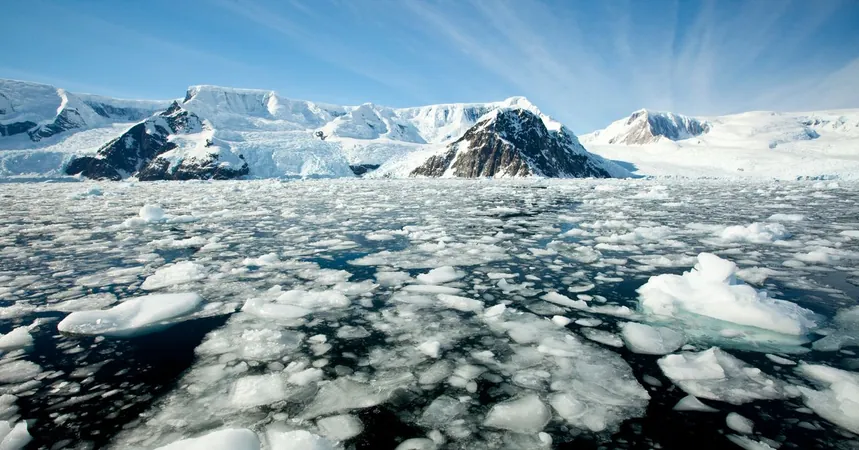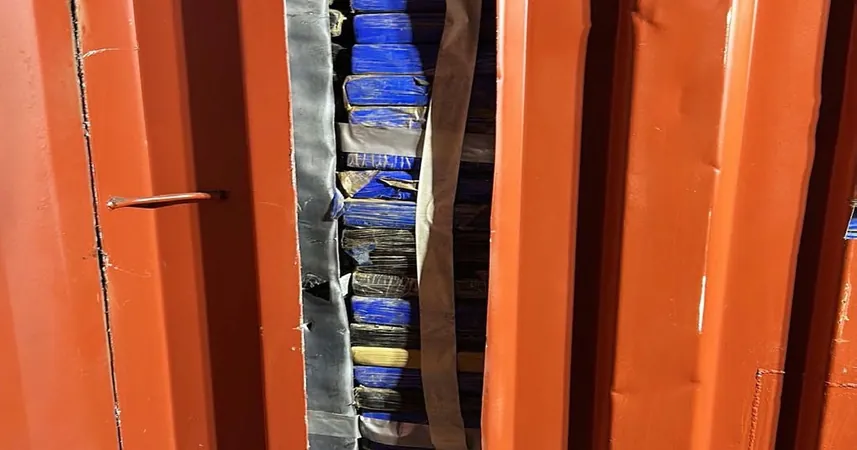
Antarctica's Ice Melt: A Dire Warning for Our Planet
2025-08-30
Author: Ting
Antarctica's Ice: A Fragile System Under Threat
From the vastness of space, Antarctica appears as a pristine white expanse, a simple contrast against the deep blue Southern Ocean. But this icy fortress hides a complex ecosystem where ocean currents, sea ice, and massive ice sheets interact in a precarious balance. Now, that balance is rapidly crumbling.
A Cascade of Catastrophic Changes
Research published in the journal Nature outlines alarming trends: a swift decline in sea ice over the past decade could push Antarctica beyond a critical tipping point, leading to severe global repercussions, including the flooding of coastal cities.
Nerilie Abram, the study's lead author and chief scientist at the Australian Antarctic Division, emphasizes the interconnectedness of changes occurring in this fragile environment. 'Every part affects another,' she warns, signaling the extensive reach of these shifts.
Abrupt Changes: What They Mean for the Future
Abrupt environmental changes in Antarctica can happen remarkably fast—from the instant collapse of ice shelves to the gradual melting of glaciers over centuries. Unfortunately, these changes can self-reinforce, creating an unstoppable cycle as global temperatures continue to rise. Abram states that the immediate choices we make regarding greenhouse gas emissions will dictate the long-term health of the continent.
The Alarming Decline of Sea Ice
A major factor in Antarctica's ongoing crisis is the dramatic loss of summer sea ice, which has decreased by a staggering 75 miles inland since a peak in 2014. In the last decade, sea ice has retreated 4.4 times faster than in the Arctic, with effects comparable to losses seen in the Arctic over the past 46 years.
Ryan Fogt, a climatologist at Ohio University, remarked that the perception of Antarctica as an untouched wilderness is changing, as the continent experiences shifts just as profound as those in the Arctic.
A Potentially Irreversible Catastrophe
Current observations signal that we might be witnessing the onset of widespread loss of Antarctic sea ice. As ice shelves deteriorate, they no longer act as protective structures for land-based ice sheets. This reduction in sea ice exposes the ice shelves to warmer ocean waters, speeding up their degradation.
Matthew England, an oceanographer, noted that the melting of these shelves could trigger massive shifts within the West Antarctic Ice Sheet, posing a risk of raising sea levels by over ten feet if global temperatures rise by just two degrees Celsius.
The Echoing Impact on Marine Ecosystems
This melting ice is also disrupting a vital oceanic system known as the Antarctic Overturning Circulation. The dilution of cold, salty water from melting ice diminishes nutrient transport essential for phytoplankton—tiny organisms critical for carbon absorption and the aquatic food web.
Moreover, iconic species like the emperor penguin are struggling as stable sea ice—their breeding ground—continues to vanish before their chicks can mature.
Urgent Action Required
The relentless warming of Antarctica is compounded by occasional extreme events, like the unprecedented heat surge in East Antarctica in March 2022, which saw temperatures soar 72 degrees Fahrenheit above normal. These acute incidents can push already stressed ecosystems past their recovery limits.
On a hopeful note, scientists are gathering more data to refine climate models and accurately predict future conditions. The only solution lies in drastically reducing greenhouse gas emissions. As England aptly states, 'Every fraction of a degree we can prevent stacks the odds against catastrophic changes.' Without immediate action, we face unprecedented global instability.




 Brasil (PT)
Brasil (PT)
 Canada (EN)
Canada (EN)
 Chile (ES)
Chile (ES)
 Česko (CS)
Česko (CS)
 대한민국 (KO)
대한민국 (KO)
 España (ES)
España (ES)
 France (FR)
France (FR)
 Hong Kong (EN)
Hong Kong (EN)
 Italia (IT)
Italia (IT)
 日本 (JA)
日本 (JA)
 Magyarország (HU)
Magyarország (HU)
 Norge (NO)
Norge (NO)
 Polska (PL)
Polska (PL)
 Schweiz (DE)
Schweiz (DE)
 Singapore (EN)
Singapore (EN)
 Sverige (SV)
Sverige (SV)
 Suomi (FI)
Suomi (FI)
 Türkiye (TR)
Türkiye (TR)
 الإمارات العربية المتحدة (AR)
الإمارات العربية المتحدة (AR)